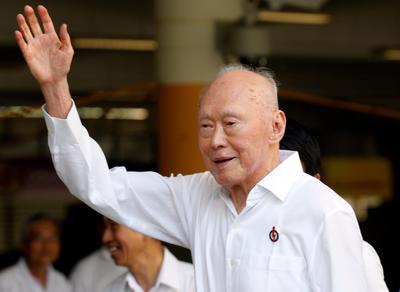But while the Prime Minister now has a relatively free hand to reshape the Singapore Cabinet and to re-invent the ruling party, dramatic changes are doubtful.
Lee Kuan Yew’s legacy has been embedded so deeply in Singapore’s institutional, social and economic life that it is likely to outlive him by decades. One might expect that he will continue to intervene on domestic issues in which he has a particular interest — such as race and language issues, education, and the wellbeing of Changi Airport and Singapore Airlines – but with Lee Senior’s moral authority diminished and his privileged access to confidential information compromised, his influence will no longer be decisive. Indeed it is apparent that he has been unable to take full control of any agenda for some years.
The international implications of Lee’s departure are also unlikely to be too profound, with Singapore’s foreign relations being affected decisively in only two main ways, one positive and one negative.
The positive implication is that Lee will be a less disruptive influence on regional relations. His many inappropriate comments about neighbours will no longer be directly associated with the Singapore government. For decades he has been a loose cannon in Singapore’s foreign relations with a bad habit of offending neighbours like Indonesia, Malaysia, Thailand and the Philippines.
The negative implication is that Lee will not be there to contribute to good relations with Malaysia. As contradictory as it seems in light of the previous point, Lee Kuan Yew has built very strong relations with the Malaysian elite, and these have weathered the tribulations of his loose tongue. In 2009, for instance, relations with the new Malaysian Government of Prime Minister Najib Tun Razak began poorly when Najib made a series of statements that seemed to be resurrecting points of tension from the Mahathir era. The Singapore government turned to then-Minister Mentor Lee Kuan Yew for help, sending him on a one week visit in June of that year to engage in discussions with a wide range of government figures, including the King and Prime Minister Najib’s wife. This resulted in an immediate de-escalation of tension. Lee is in remarkable health for a man of his age, and he is still able to travel so he may be able to continue playing such a role from the back bench simply because he is Lee Kuan Yew, but this must now be regarded as a diminishing asset.
On the broader international relations front, Singapore has lost its highest-profile advocate (and trouble maker), but Singapore’s foreign policy establishment is sufficiently professional and extensive for this to be of only marginal consequence either way.
Dr Michael D Barr is senior lecturer in international relations and a member of the Flinders Asia Centre Management Committee, Flinders University.


Michael,
Picking up on your observation that Lee Jnr has shifted blame for the election results to predecessors and a couple of under-performing ministers, what has the government really taken away as the message of the election? They seem determined to make a showing of eating a small portion of humble pie while strongly resisting the real sentiment in Singapore.
By “real sentiment” of course, I mean my own subjective interpretation gleaned from discussions with Singaporean students living in Australia and following their discussions on social networks, including what youtube videos and speeches they share and watch. Maybe I should call it a “selective sentiment”.
Anyway, that sentiment was a strong rejection of the single party state. Singaporeans seem to want a freer, more democratic politics. How they stand on any other issue seems to take second place to the conflict between expressing that desire, and concern over the consequences for expressing that desire.
So two questions:
1. Am I interpreting this sentiment correctly, is it wide spread?
2. Has the government figured this out and do they intend to do anything about it?
Frankly, isn’t Singapore what she is today because of the PAP? Will ousting the PAP in the next GE do Singapore any good? Does Singapore has a stand by alternative government?
Yes. You are right. The real sentiment is for a multi-party parliament and real democracy that the current ruling PAP refuses to accept. The current PAP government is not accountable and transparent to the people. It is not a democratic but a dictatorship society. The youths are more educated and understand the need for a democratic and justice country. Most middle-class Singaporeans dare not to speak out and want a change because of the economic impact to their good living standard. This is a result of building a nation based heavily on economic growth. Now, there are signs of economic downfall e.g. under- or un-employment and widening income gaps, the middle-class now has no economic incentive to support this rotten government. No matter what the current government id doing now, the leopard will not change its spots so the radical change in Singapore political system is just a matter of time. It in inevitable.
You may have read a book edited by Michael Haas: The Singapore Puzzle. It predicted the reasons for the downfall of the PAP government. It might well be true that PAP will be out in GE2016 if there is no dirty or foul play by the PAP government to get rid of those emerging oppositions in GE2011. After LKY kicks the bucket, the change is expected to speed up.